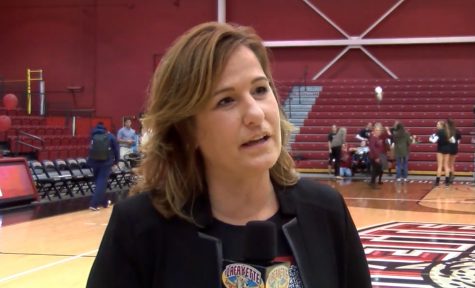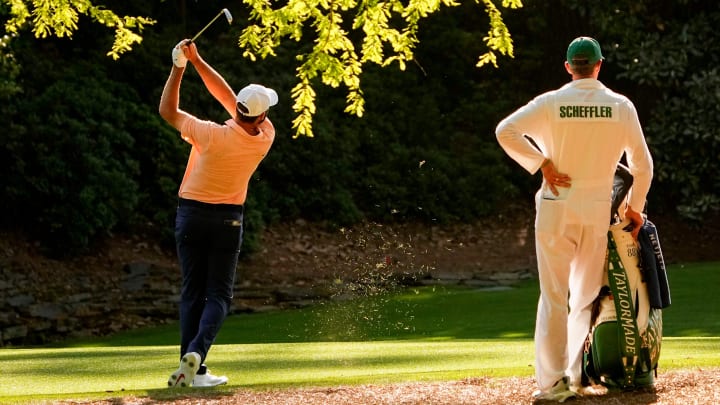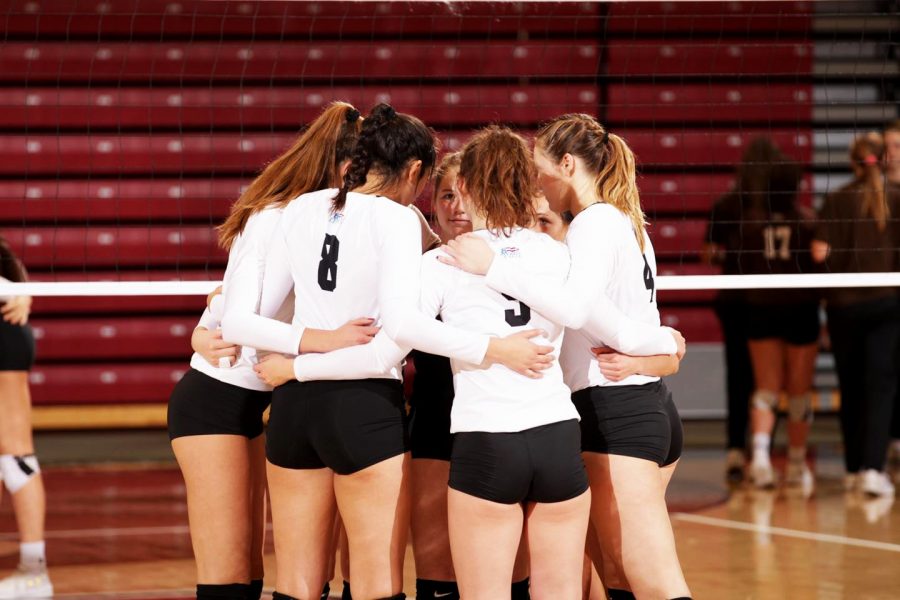A “change in leadership.” That’s all the Lafayette athletics department said when they announced in December that veteran head coach Terri Dadio Campbell ‘92 would no longer lead the women’s volleyball team.
An investigation by The Lafayette has found, however, that Campbell—who coached several teams at colleges in Virginia, New Jersey and Pennsylvania during a distinguished career—was in fact fired. And, for several years before her dismissal, athletes complained to the department that she was verbally abusive, mishandled injuries and humiliated players on what, some claimed, was a routine basis.
In The Lafayette’s interviews with eight sources who have played under Campbell, reviews on her coaching were mixed overall. Common to the sources’ descriptions were that Campbell’s style was tough—she expected a lot from her players, and some described it as appropriate for a Division I level. Other sources alleged mental abuse when describing their experiences.
A current student, who played on the team during the 2017 season, alleged that she went to every practice “knowing I was going to get ripped into, knowing I was going to be called useless and invisible.” She wished to remain anonymous out of fear of repercussions from the athletic department.
“[Campbell] constantly was nasty to me, calling me out…screaming at me,” she alleged. “She verbally, mentally, emotionally abused us.”
In a personal statement sent into the athletic department in April 2016, former player Maria Balus wrote that team members’ “health and academic success are hindered by our coach’s decisions.”
A former player from the 2014 team, who wished to remain anonymous due to the tight-knit nature of current and former players’ relations, claimed that Campbell failed to “treat the entire player” with regards to physical, athletic and mental wellness.
Not only did the department fail to address complaints dating back to at least 2015, but the current players were specifically told by administrators not to talk to the press about the circumstances surrounding the demise of Campbell’s 17-year tenure.
The Lafayette reached out to more than 50 athletes who played under Campbell since she came to Lafayette in 2002. Some were very supportive of Campbell’s style, but others were not. Few were willing to use their names for fear of reprisals either from the department or other teammates.
In a message sent to the volleyball team GroupMe chat on Feb. 1, obtained by The Lafayette, then-interim head coach Colton Reinholtz said that it is “highly suggested” that the players “do not respond to [requests for] questions or give comments,” if contacted by The Lafayette about Campbell’s departure. Reinholtz wrote that he sent the message at the direction of Associate Athletic Director Andrew Foster.

No players took the allegations beyond the athletic department or filed a lawsuit. Campbell declined to comment on the allegations.
Aside from alleged psychological abuse, a lack of proper treatment for injuries was a common allegation from the sources. Some former players claimed that Campbell urged them and their teammates to play through their injuries, and to not report them to the athletic trainer to avoid missing time—and two assistant coaches claimed that there was not a good relationship between the coaches and trainers.
One former player, who wished to remain anonymous to protect the privacy of her medical history, said that the mishandling of her injury affected her ability to perform activities later in life, and confirmed that it was an issue for another player, as well.
“[Campbell] would push [players] athletically and would not understand the way she communicates with a player almost hinders their performance,” she said. “After this injury happened, I was one of the players who she stopped developing.”
“I was unable to tell the truth to the training room,” Balus wrote in a letter to the athletic department in the spring of 2016. “I could not explain why I needed ankle braces for the next couple of practices and consequently was not able to receive any support for my ankle.”
Morgan Loeffler ‘14, who played on the 2010 team, alleged there were “at least a couple of injuries mishandled” during her four years with the team. She explained that there should have been more support for the players who were actually playing, but noted that players sometimes push back and want to play anyways despite injuries.
Former assistant coach Sam Haimann, who was with the program from 2015-2018, said that the “clear disconnect” stemmed from an athletic training representative, confirmed by several sources as Assistant Athletic Trainer Nicole Layden, failing to provide adequate care.
Former assistant coach J.T. Pursel, who was with the team from 2009-2015, said that there was a “contentious relationship between the training room and the team.”
“There was a belief on the team that if you went to the training room about small things, that their first response is to shut you down,” he added.
Layden declined to comment on her time as a trainer with the team and on Campbell’s career, and like many others, directed The Lafayette to the communications division.
“It was brought to my attention on more than one occasion, in more than one year, that the representative of the team [Layden] was not effective in her assessment, treatment, and follow-through with the team,” Haimann said. “And I know that coach Campbell had had more than one discussion on hoping to procure an alternate trainer for our program.”
In an interview with The Lafayette 10 days ago, Athletic Director Sherryta Freeman confirmed for the first time that Campbell was fired, citing only the team’s abysmal win/loss record.
Freeman responded only vaguely to questions about the complaints against Campbell and would not discuss the coach’s future at Lafayette, whether or not she has a contract, whether or not she will stay at Lafayette [Campbell is currently a Special Project Assistant at the college] or if Campbell, 49, intends to find another coaching job elsewhere.
Freeman said that the message from Reinholtz and Foster to the volleyball team is “not the message I approved” and that it was a “miscommunication.” Senior Communications Director Scott Morse said Foster and Reinholtz declined to comment.
After being told of the numerous complaints by current and former players in an interview with The Lafayette, Freeman said that “there was nothing of that sort reported to me,” and that the department did not receive those kinds of complaints in the past year since she took over for former Athletic Director Bruce McCutcheon. Morse said McCutcheon said that he was not interested in commenting.
Campbell became the volleyball program’s first full-time head coach in school history in 2002 after a successful stint as both the women’s basketball and volleyball coach at Washington & Lee University. When Campbell arrived at Lafayette, she inherited a program that was in “shambles,” according to Kate Walkenhorst ’05, who played on the team from 2001-2003 and served as a student-assistant coach in 2004.
“Terri was very much what I grew up being used to from a coach,” Walkenhorst said. “If you work hard for me, I will work hard for you. She will be hard on you. But I think that, to me, is a coach.”
Ashton Charette ‘10, who played volleyball all four years of college and developed a close relationship with her head coach, said that Campbell’s coaching style was “totally fair for a division I sport.”
“Obviously her coaching style doesn’t fit everyone and if someone’s a little more sensitive or a little more emotional, then her expecting more out of you [during conditioning or in a drill] and you taking it personally isn’t going to be a good fit,” she said.
“In the time I was at Lafayette, anyone saying the conditioning or Terri was abusive was not prepared to compete at the division I level,” said Pursel, who was with the program from 2009-2015.
From 2004-2006, the team posted three consecutive winning seasons overall, including their first winning season in 10 years after finishing the 2004 campaign with a 15-14 overall record. Her best year with the program came in 2006, when the team went 18-10 overall and 9-5 in conference and made the Patriot League Tournament for the first and only time during her tenure. It was their only year over .500 within the Patriot League. The team went on to lose in the first round of the conference tournament to eventual champion American University.
The program’s last winning season was in 2009 with a 14-13 overall record and a 5-9 record in the conference, before a decade of losing which culminated in the team going 0-16 in the Patriot League last fall.
Haimann said that Campbell coached with intensity and passion, but that it “was always from a place of care.”
“She never didn’t care about people,” he said. “She just wanted to push people to be their best and help them realize the potential that they had.”
Faculty advisor to the volleyball team Markus Dubischar, who somewhat regularly attends volleyball practices and games, said that he saw nothing but positive behavior from Campbell during his time with the team, and was surprised to learn of the allegations against the former coach.
Pursel, Walkenhorst, Haimann and numerous others connected to the volleyball program said Campbell was completely under-supported by the athletic department throughout her tenure. This lack of support stemmed from meager funding, and resulted in no scholarship money for years, no full-time assistant coaches until 2015, and players even soliciting their parents for money for jerseys.
“[Campbell] had to divide her time between being a head coach and being a fundraiser,” Walkenhorst said. “I was going to my parents and asking for money for the volleyball program. That’s embarrassing.”
“I think Terri, given the very few resources that she had, she did what was asked of her when she was hired,” Walkenhorst added. “She [coached] with both hands tied behind her back.”
“The athletic department absolutely hamstrung the volleyball team for years,” Pursel said. “She competed at a high level recruiting and winning when really the odds were very far against her. The amount of over the top stuff that Terri had to do just to keep the program afloat was astronomical.”
“[Campbell] was in the [athletic director’s] office constantly, saying, ‘We need new uniforms, We haven’t had new uniforms in five years. I can’t ask a parent to pay for them,’” said Walkenhorst. “Terri did do her part in changing the culture, but the athletic department didn’t do their part.”
Freeman acknowledged that the department needs to find better resources for their programs, including volleyball. This need for more funding was included in the athletic strategic plan released last fall.
Despite Campbell’s dedication and persistence, morale continued to decline among the players, especially in recent years.
The allegations against Campbell came to a head in 2015, when a number of players reportedly approached McCutcheon and demanded a sit-down. This came after a team-wide document was signed by players and sent into the athletic department outlining issues with Campbell and the program.
“We went to the athletic department with all of these truthful allegations and nothing happened,” said Balus. “We prepared this whole petition and a bunch of girls wrote their own personal statements, and nothing happened. That was the worst part.”
“McCutcheon dragged coach Campbell into human resources and had a conversation with her with no warning after that [the document signed by team members] all came out in 2015,” Haimann said. “We were very aware of what was going on because I think what the team wrote in the letters circumvented the traditional chain of command.”
Freeman, the Athletic Director since February 2018, said that allegations were not made during her time at Lafayette. She would not discuss prior claims from before her hiring, saying she was not made aware of them when she took on the role of Athletic Director in February.
A current student and former player said that the team met with Freeman in early May 2018 to discuss concerns about Campbell and the volleyball program with her and Assistant Director of Athletics Brad Potts. Freeman “wrote down every word that each teammate said,” according to the student, who wished to remain anonymous due to fear of repercussions from the school. She added that “[Freeman] asked many questions and there were many tears shed.”
Campbell confirmed that Freeman met with the volleyball team in the spring, but declined to comment on the allegations.
In a personal letter sent to Freeman in May 2018, the student described Campbell as having the tendency to “single out people on the team in an undermining way.” Freeman confirmed that she met with a student, who was no longer on the team, about the volleyball program in the last year, and that the student “may have sent a letter beforehand.”
Freeman and Morse did not respond to The Lafayette to confirm they received any letters or the team-signed document, despite numerous attempts to contact both of them during a week-long period. Freeman initially admitted that they could check if the department had a record of the letter and the team-signed document from 2015, and agreed to confirm their existence.
Freeman said she was not informed by McCutcheon of the previous complaints about the volleyball program when she took over last year. McCutcheon, who has since retired, and other department administrators alleged to have been in the meeting in 2015, including Deputy Director of Athletics Kaitlyn McKittrick, declined to comment, according to Morse.
Vice President of Campus Life Annette Diorio, who is the supervisor of the Athletic Director, declined to comment “on either the [volleyball] program or personnel.”
College coaches being suspended or fired is not unusual. In the last month alone, at least three prominent women’s coaches have been benched in the NCAA, and in those cases, the universities in question also refused to release any explanation.
Sports psychologists also note that what students perceive as abuse may be no different from what the coaches themselves endured when they were college athletes.
Sports psychologist Jarrod Spencer, who worked with the volleyball program, among other Lafayette teams, during Campbell’s earlier years, said that the “increasing rise of mental health awareness” has contributed to a shift in coaching styles and player-coach interactions.
“Over the last 15 years, there’s been an increasing rise of mental health concerns and mental health awareness, hence my role,” said Spencer, who has not worked directly with the volleyball program since 2014. “So the emotional health of not just the athlete but of the coaches and anybody working in athletics, there’s been increased stress. And that’s changed the dynamics of how coaches can coach and interact with athletes.”
Kathryn Kelly ‘19 contributed reporting.
Update (5/3/19): Terri Campbell’s graduation year was not originally included in this piece. She graduated the college class of 1992.

























































































































